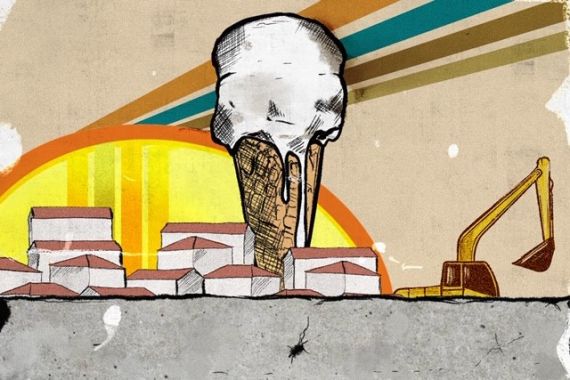That time an Israeli-Palestinian ice cream feud refused to melt
In his new regular column, veteran journalist A. Craig Copetas revisits some of his most memorable interviews and examines their continued relevance today. In this one, he reveals what an Iraqi baker and a Syrian ice cream maker could teach Ben & Jerry.

In one big scoop, American ice cream tycoons Ben & Jerry recently announced they would no longer sell any of their 54 flavours in the Israeli-occupied Palestinian territories. A thousand puns later, the 1,000-calories-a-pint controversy refuses to melt and the cold war continues.
Israeli President Isaac Herzog pooh-poohed the boycott as “a new form of terrorism”.
Keep reading
list of 4 itemsNearly 55 million face hunger in West and Central Africa, UN warns
Revisiting molokhia amid war and displacement in Gaza
The iftar hotspot in New Delhi – launched by a citizenship law protest
Arab Israeli lawmaker Ayman Odeh, who supports the embargo and represents many Palestinian citizens of Israel, shot back: “The diet is going well.”
But the pundits, politicians and think-tankers on all sides of this bittersweet global quarrel are so justifiably consumed with the dreadful relationship between Israel and Palestine that they cannot see the ice for the cream; specifically, Ben & Jerry’s is neither as good nor as politically sustainable as the company’s marketing department has tub-thumped since the two Vermont hippies in 1978 started stirring the stuff out of bespoke cows.
Yet buried in Ben & Jerry’s sales statistics is a road map to solving the Israeli-Palestinian ice cream conflict and, as Afran al-Saddi insisted as we outlasted a missile barrage in his Basra bakery during the second war in Iraq, reunite the bickering children of Abraham.
“Baksam,” al-Saddi said.
“Peace through cookies and ice cream,” added electrical engineer Radi al-Kabe, dipping what was undoubtedly the yummiest cookie ever baked into a pouch of what was the nastiest reanimated military issue freeze-dried ice cream to roll off an assembly line.
Before revealing baksam’s recipe and biting into this mildly sweet treat al-Saddi’s grandfather created in 1920, consider that all of Ben & Jerry’s bestselling ice creams contain cookies: Cookies and Cream; Chocolate Chip Cookie Dough; Mint Chocolate Chip Cookie, and Tonight Dough.
Auto mechanic Hameed Abdullah Rasheed – who during the war turned spent shell casings from Saddam Hussein’s arsenal of Soviet T-52 tanks into the petrol-fuelled ovens that baked baksam without any collateral damage – described the sand-coloured oval cookie of Basra as the ultimate peacemaker.
“Baksam,” Rasheed insisted, “united all of Iraq’s cultures and religions.”
The secret that makes baksam the king of all cookies is baladi oil. As al-Saddi told it, Bedouin shepherds are the only people who know how to gather baladi oil. “It’s skimmed from the fresh milk of sheep,” he explained. “Collecting baladi is a top-secret art.”
Meanwhile, a 13-hour drive west in Damascus, churning away in the Al-Hamidiyah Souq since 1895, is booza. It is the greatest ice cream in the Milky Way. Accept no substitutes. The Bekdash family’s signature ice cream has been organic for 126 years and comes in one flavourless flavour so heavenly that it needs no perfume. All other ice creams by comparison taste like leftover snow with treacle sauce.
Booza is either plopped atop a cone or delivered in a glass cup. Bring a bucket and take some home, or pull up a chair and savour one serving, three if you must. A generous dribble of pistachios on top is the only option.
I believe, or at least claim to believe, the most important lesson I’ve learned as a foreign correspondent is that a country’s cuisine – and sitting down for a meal to chat about solutions to problems – tells us more about a place and the aspirations of its people than can be found in a dozen press conferences to question conflicting policy initiatives.
My proposal to end the Israeli-Palestinian ice cream feud is modest. First, diplomatically, of course, both parties tell Ben & Jerry to peddle their ice cream elsewhere.
Second, find an Israeli and a Palestinian investor to strike a deal with al-Saddi in Basra and Bekdash in Damascus to manufacture and distribute baksam and booza ice cream.
And do not concern yourselves about doing business with Syria. The Bekdash family in 2013 opened an outlet in Amman, and I hear the booza there is out of this world, too.
Naïve? I figure it depends on if you have the stomach for it.
The views expressed in this article are the author’s own and do not necessarily reflect Al Jazeera’s editorial stance.